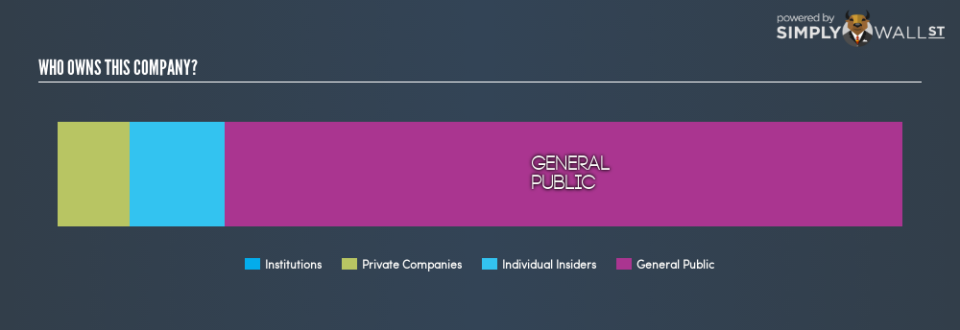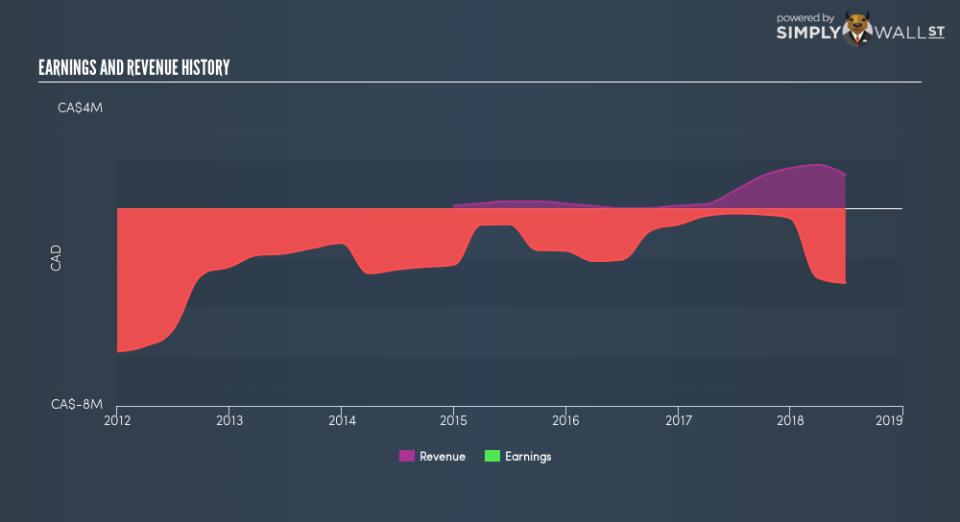Do Insiders Own Lots Of Shares In Canada Rare Earth Corp (CVE:LL)?

Every investor in Canada Rare Earth Corp (CVE:LL) should be aware of the most powerful shareholder groups. Insiders often own a large chunk of younger, smaller, companies while huge companies tend to have institutions as shareholders. I quite like to see at least a little bit of insider ownership. As Charlie Munger said ‘Show me the incentive and I will show you the outcome.’
Canada Rare Earth is a smaller company with a market capitalization of CA$9.5m, so it may still be flying under the radar of many institutional investors. Taking a look at the our data on the ownership groups (below), it’s seems that institutions don’t own shares in the company. Let’s delve deeper into each type of owner, to discover more about LL.
See our latest analysis for Canada Rare Earth
What Does The Lack Of Institutional Ownership Tell Us About Canada Rare Earth?
Institutional investors often avoid companies that are too small, too illiquid or too risky for their tastes. But it’s unusual to see larger companies without any institutional investors.
There could be various reasons why no institutions own shares in a company. Typically, small, newly listed companies don’t attract much attention from fund managers, because it would not be possible for large fund managers to build a meaningful position in the company. It is also possible that fund managers don’t own the stock because they aren’t convinced it will perform well. Institutional investors may not find the historic growth of the business impressive, or there might be other factors at play. You can see the past revenue performance of Canada Rare Earth, for yourself, below.
We note that hedge funds don’t have a meaningful investment in Canada Rare Earth. We’re not picking up on any analyst coverage of the stock at the moment, so the company is unlikely to be widely held.
Insider Ownership Of Canada Rare Earth
While the precise definition of an insider can be subjective, almost everyone considers board members to be insiders. The company management answer to the board; and the latter should represent the interests of shareholders. Notably, sometimes top-level managers are on the board, themselves.
I generally consider insider ownership to be a good thing. However, on some occasions it makes it more difficult for other shareholders to hold the board accountable for decisions.
Our information suggests that insiders maintain a significant holding in Canada Rare Earth Corp. Insiders own CA$1.1m worth of shares in the CA$9.5m company. This may suggest that the founders still own a lot of shares. You can click here to see if they have been buying or selling.
General Public Ownership
The general public — mostly retail investors — own 80% of Canada Rare Earth . This size of ownership gives retail investors collective power. They can and probably do influence decisions on executive compensation, dividend policies and proposed business acquisitions.
Private Company Ownership
It seems that Private Companies own 8.5%, of the LL stock. It might be worth looking deeper into this. If related parties, such as insiders, have an interest in one of these private companies, that should be disclosed in the annual report. Private companies may also have a strategic interest in the company.
Next Steps:
It’s always worth thinking about the different groups who own shares in a company. But to understand Canada Rare Earth better, we need to consider many other factors.
I always like to check for a history of revenue growth. You can too, by accessing this free chart of historic revenue and earnings in this detailed graph.
Of course, you might find a fantastic investment by looking elsewhere. So take a peek at this free list of interesting companies.
NB: Figures in this article are calculated using data from the last twelve months, which refer to the 12-month period ending on the last date of the month the financial statement is dated. This may not be consistent with full year annual report figures.
To help readers see past the short term volatility of the financial market, we aim to bring you a long-term focused research analysis purely driven by fundamental data. Note that our analysis does not factor in the latest price-sensitive company announcements.
The author is an independent contributor and at the time of publication had no position in the stocks mentioned. For errors that warrant correction please contact the editor at editorial-team@simplywallst.com.

 Yahoo Finance
Yahoo Finance 

